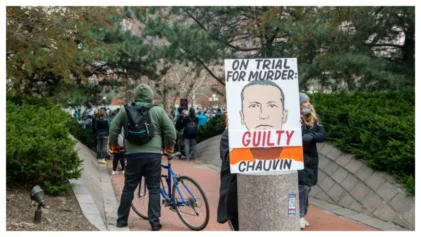A judge changed the terms of Derek Chauvin’s bond on Thursday, Oct. 8 — one day after the former Minneapolis police officer charged with second-degree murder in the death of George Floyd was released on $1 million bond.
The new terms allow Chauvin, 44, to leave the state, which was prohibited by the previous order. Hennepin County Judge Peter A. Cahill cited “evidence supporting safety conditions that have arisen” as the reason for the decision, The Washington Post reported.

Per Cahill’s order, Chauvin can “establish residency somewhere in the state of Minnesota or a contiguous state.” His options include Iowa, North or South Dakota, or Wisconsin.
According to the order, Chauvin’s temporary address is to be kept confidential aside from those who need to know, including the court, attorneys and other law enforcement officials.
Prior to his release on Wednesday, Oct. 7, Chauvin was being held at the Oak Park Heights maximum security prison. He is awaiting trial on charges of second- and third-degree murder and manslaughter for Floyd’s death.
Minnesota law requires 10 percent of a bond to be paid, which would be $100,000 in Chauvin’s case. While Allegheny Casualty Company was the collector of the bond, the source that paid Chauvin’s bail is unknown.
Chauvin is one of four officers charged in the death of Floyd, who was killed on Memorial Day, May25, after Chauvin kneeled on his neck for over eight minutes despite Floyd’s repeated outcries that he couldn’t breathe.
The world erupted in protests and fueled unprecedented support for the Black Lives Matter movement after cellphone video of the encounter went viral.
People around the country are outraged about Chauvin’s release. Many have called it yet another example of white privilege that would not be afforded if the roles were reversed.
“No way in hell if a Black cop stood on a White mans (sic) neck until he died would he be allowed to post bail,” one woman tweeted in reaction.
“Kalief Browder is dead today cuz his mother couldn’t afford $3000 bail so he spent 2 years abused in solitary confinement at Rikers for allegedly stealing a backpack. F–k Derek Chauvin, this system and end cash bail for all the Kalief Browder’s who don’t have Chauvin’s friends,” wrote journalist Chuck Bodi.
Civil rights attorney Benjamin Crump, who represents the Floyd family, was among those who criticized Chauvin’s release. He called it “a painful reminder … that we are still far from achieving justice for George.”
“The system of due process worked for Chauvin and afforded him his freedom while he awaits trial. In contrast, George Floyd was denied due process, when his life was ended over a $20 bill. … We will not rest until he is afforded full justice in death. The civil litigation team looks forward to our day in court,” Crump added in a statement.
Other terms of Chauvin’s bond include: having no contact with Floyd’s family; being restricted from carrying firearms or working in security; and surrendering his passport.
Chauvin must also keep a cellphone on him at all times and answer whenever he is contacted by the Department of Corrections.
The other three officers involved in Floyd’s death — J. Alexander Kueng, Thomas Lane and Tou Thao — are charged with aiding and abetting. They too have been released on bond.
All four men’s attorneys have asked the trial to be moved out of Minnesota, arguing it will be difficult to find an impartial jury to have a fair trial.
Chauvin is due in court in March 2021.


